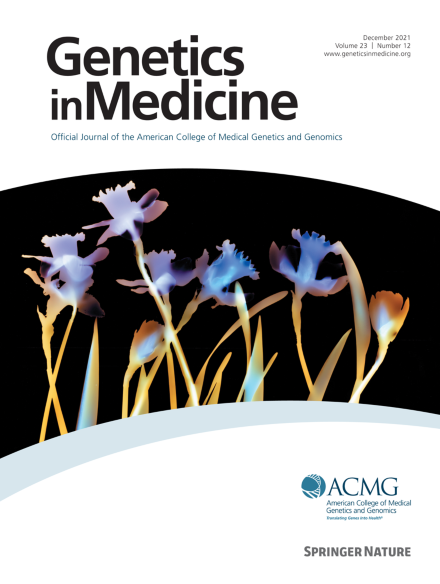在急诊儿科环境中提供复杂基因组筛查:家庭决策和结果。
IF 6.6
1区 医学
Q1 GENETICS & HEREDITY
引用次数: 0
摘要
目的:接受超快速基因组测序的儿科急诊患儿家属在高度紧张的时期做出了复杂的决定。为了降低家庭和临床医生的复杂性,我们在诊断测试完成后为患儿和家长提供了基因组筛查。我们对筛查的接受程度、理解程度和服务提供偏好进行了评估:在澳大利亚 17 家医院完成超快速诊断基因组测序的 235 个家庭组成的队列中,我们为他们的基因组数据提供了三种筛查:儿童发病型、成人发病型和扩大的夫妇携带者筛查。我们在三个时间点(咨询前、咨询后、结果后)使用调查问卷调查了决策、理解和服务提供偏好,并对检测前遗传咨询记录进行了归纳内容分析:119个家庭(51%)参加了遗传咨询,其中115个家庭(49%)接受了基因组筛查。与成人(68%;p=0.002)或儿科(71%;p=0.01)筛查决定相比,调查对象更倾向于认为夫妇携带者筛查决定 "容易"(87%)。所有新检测出致病变异体的受访者在一个月后都能准确回忆起这一点。大多数受访者(78%)都能接受延迟筛查:结论:将基因组筛查从紧张的诊断期中分离出来的做法得到了家庭的支持,这些家庭对基因组筛查有很好的了解和回忆。我们的研究结果表明,应更广泛地试用延迟基因组筛查。本文章由计算机程序翻译,如有差异,请以英文原文为准。
Offering complex genomic screening in acute pediatric settings: Family decision-making and outcomes
Purpose
Families of children in pediatric acute care who are offered ultrarapid genomic sequencing are making complex decisions during a high-stress period. To reduce complexity for families and clinicians, we offered genomic screening for the child and parents after the completion of diagnostic testing. We evaluated uptake, understanding, and service delivery preferences.
Methods
A cohort of 235 families who had completed ultrarapid diagnostic genomic sequencing at 17 Australian hospitals were offered up to 3 screens on their genomic data: pediatric-onset, adult-onset, and expanded couple carrier screening. We investigated decision making, understanding, and service delivery preferences using surveys at 3 time points (pre counseling, post counseling, and post result) and performed inductive content analysis of pretest genetic counseling transcripts.
Results
A total of 119 families (51%) attended genetic counseling with 115 (49%) accepting genomic screening. Survey respondents were more likely to find decisions about couple carrier screening easy (87%) compared with adult (68%; P = .002) or pediatric (71%; P = .01) screening decisions. All respondents with newly detected pathogenic variants accurately recalled this 1 month later. A delayed offer of screening was acceptable to most respondents (78%).
Conclusion
Separating genomic screening from the stressful diagnostic period is supported by families who demonstrate good knowledge and recall. Our results suggest delaying genomic screening should be trialed more widely.
求助全文
通过发布文献求助,成功后即可免费获取论文全文。
去求助
来源期刊

Genetics in Medicine
医学-遗传学
CiteScore
15.20
自引率
6.80%
发文量
857
审稿时长
1.3 weeks
期刊介绍:
Genetics in Medicine (GIM) is the official journal of the American College of Medical Genetics and Genomics. The journal''s mission is to enhance the knowledge, understanding, and practice of medical genetics and genomics through publications in clinical and laboratory genetics and genomics, including ethical, legal, and social issues as well as public health.
GIM encourages research that combats racism, includes diverse populations and is written by authors from diverse and underrepresented backgrounds.
 求助内容:
求助内容: 应助结果提醒方式:
应助结果提醒方式:


